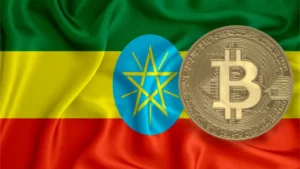-
Cyril Ramaphosa, who was re-elected as president of South Africa, led the first multi-party coalition government, the African National Congress, in the country’s history.
-
According to the Financial Sector Conduct Authority, South Africa’s crypto industry will continue to develop.
-
A crypto licensing regime has been implemented in the country, and regulations regarding stablecoins and tokenization are currently being considered.
The recent re-election of Cyril Ramaphosa from the African National Congress (ANC) marks a significant political milestone for South Africa.
Despite the ANC losing its majority, this election result is not expected to impact the country’s crypto industry significantly.
South Africa Re-Elects Cyril Ramaphosa of the African National Congress as President
South African President Cyril Ramaphosa, representing the ANC, was re-elected on Friday, leading the country’s first multi-party coalition government. The ANC secured 159 seats, falling short of the 200 needed for a majority. Consequently, a fragile coalition government, dubbed the Government of National Unity, was formed with the Democratic Alliance (DA), Inkatha Freedom Party, and the smaller Patriotic Alliance.
The ANC has ruled South Africa for 30 years since the end of apartheid in 1994. This election grants the ANC another five years of governance, albeit without the substantial majority it once held. In the previous parliament, the ANC had 230 seats.
Impact on South Africa’s Crypto Industry
The election results are not anticipated to significantly influence South Africa’s burgeoning crypto industry. The Financial Sector Conduct Authority, the country’s primary regulator, recently established a crypto licensing regime, positioning South Africa as one of the pioneering African nations in this domain. This regime involves licensing digital asset firms, with companies like Luno, Zignaly, and VALR being among the first to receive licenses in April.

In 2022, South Africa included virtual asset service providers in its Financial Advisory and Intermediary Services Act, thus regulating digital assets as financial products. The nation’s Intergovernmental Fintech Working Group is expected to examine use cases for stablecoins, consider regulatory responses this year, and explore the implications of tokenization.
Regulatory Developments in the Crypto Sector
In April, South Africa began consulting on a directive to include crypto in the country’s Travel Rules. These rules, once gazetted, will mandate virtual asset service providers to transmit information on wallets and passports during transfers.
This aligns with the global trend of implementing the Financial Action Task Force’s travel rule, which requires nations to share information on crypto transactions to combat money laundering.
ALSO, READ; Scam-Proof Crypto Licensing Revolutionizes South Africa’s Market.
The global adoption of these regulations reflects a growing consensus on the need for a structured approach to the crypto industry. South Africa’s proactive stance, through its crypto licensing regime and regulation of stablecoins and tokenization, showcases its commitment to leading in the African crypto space.
Coalition Government: A New Era
Forming a coalition government represents a watershed moment in South African politics. The African National Congress and its most significant rival, the pro-business Democratic Alliance, have agreed to collaborate in South Africa’s new government of national unity. This historic accord allowed President Ramaphosa to secure a second term, re-elected by lawmakers with 283 votes.
This agreement between two previously antagonistic parties is the most significant political shift since Nelson Mandela led the ANC to victory in the 1994 election, ending apartheid. President Ramaphosa expressed his pleasure in serving the nation and emphasized the new era of hope and inclusivity in his speech to parliament.
ALSO, READ; Regulatory Initiatives in South Africa: Creating a Successful Crypto Ecosystem.
The Challenges and Opportunities Ahead
The ANC’s loss of a majority for the first time in the May 29 election led to two weeks of intense negotiations with other parties. This culminated in the coalition government’s formation as the new parliament convened in Cape Town. DA leader John Steenhuisen described the day as historic, marking a new chapter focused on the country’s interests and future.
The National Assembly’s election of a DA lawmaker as deputy speaker, alongside an ANC politician as a speaker, demonstrated the practical implementation of power-sharing between the two parties. This move highlights a shift towards collaborative governance, addressing the nation’s persistent issues such as poverty, inequality, and corruption.
The DA’s entry into national government is a significant step for a country still grappling with the legacy of apartheid. The DA advocates for scrapping some of the ANC’s Black empowerment programs, arguing they have mainly benefited a politically connected elite and proposing good governance and a strong economy that benefits all South Africans.
Some ANC politicians have opposed the DA’s presence in the government. Meanwhile, the Economic Freedom Fighters, securing nearly 10% of the vote, criticized the DA for representing privileged white interests—a charge the DA denies.
In conclusion, while South Africa’s political landscape undergoes significant changes, the crypto industry’s regulatory environment is set to continue evolving, focusing on stablecoins, tokenization, and virtual asset service providers. President Ramaphosa’s coalition government heralds a new era of political collaboration and economic opportunity for the ANC.
- SEO Powered Content & PR Distribution. Get Amplified Today.
- PlatoData.Network Vertical Generative Ai. Empower Yourself. Access Here.
- PlatoAiStream. Web3 Intelligence. Knowledge Amplified. Access Here.
- PlatoESG. Carbon, CleanTech, Energy, Environment, Solar, Waste Management. Access Here.
- PlatoHealth. Biotech and Clinical Trials Intelligence. Access Here.
- Source: https://web3africa.news/2024/06/25/news/african-national-congress-crypto/
- :has
- :is
- :not
- 1
- 1994
- 200
- 2022
- 29
- 30
- a
- accord
- Act
- Action
- addressing
- Adoption
- advisory
- advocates
- africa
- African
- africans
- agreed
- Agreement
- Aligns
- All
- Alliance
- allowed
- alongside
- among
- an
- and
- Another
- Anticipated
- approach
- April
- ARE
- AS
- asset
- Assets
- authority
- been
- began
- being
- benefited
- benefits
- between
- Black
- burgeoning
- by
- cape
- cases
- challenges
- Changes
- Chapter
- charge
- coalition
- collaborate
- collaboration
- collaborative
- combat
- commitment
- Companies
- conclusion
- Conduct
- Congress
- connected
- Consensus
- Consequently
- Consider
- considered
- consulting
- continue
- convened
- Corruption
- country
- country’s
- Creating
- crypto
- Crypto Industry
- crypto space
- crypto transactions
- Currently
- da
- day
- democratic
- demonstrated
- deputy
- described
- develop
- developments
- digital
- Digital Asset
- Digital Assets
- domain
- dubbed
- during
- Economic
- economy
- Election
- elite
- emphasized
- emphasizing
- empowerment
- end
- ending
- entry
- Environment
- Era
- established
- evolving
- examine
- expected
- explore
- expressed
- Falling
- falling short
- fighters
- financial
- Financial Advisory and Intermediary Services Act
- financial products
- Financial sector
- Financial Sector Conduct Authority
- fintech
- Fintech Working Group
- firms
- First
- first time
- five
- focused
- focusing
- For
- formation
- formed
- Freedom
- Friday
- from
- future
- Global
- good
- governance
- Government
- grants
- grappling
- Group
- Growing
- had
- Have
- Held
- heralds
- highlights
- his
- historic
- history
- hope
- HTTPS
- Impact
- implementation
- implemented
- implementing
- implications
- in
- include
- included
- Inclusivity
- industry
- industry’s
- inequality
- influence
- information
- initiatives
- intense
- interests
- intermediary
- into
- involves
- issues
- IT
- ITS
- John
- landscape
- Laundering
- lawmaker
- lawmakers
- leader
- leading
- Led
- Legacy
- licenses
- Licensing
- like
- losing
- loss
- Luno
- mainly
- Majority
- mandate
- marking
- max-width
- May..
- Meanwhile
- milestone
- moment
- money
- Money Laundering
- most
- move
- multi-party
- nation
- National
- Nations
- nearly
- Need
- needed
- negotiations
- New
- of
- on
- once
- ONE
- opportunities
- Opportunity
- opposed
- Other
- parliament
- parties
- party
- passports
- Pioneering
- plato
- Plato Data Intelligence
- PlatoData
- pleasure
- political
- politically
- politician
- Politicians
- politics
- positioning
- Poverty
- Practical
- presence
- president
- previous
- previously
- primary
- privileged
- Proactive
- Products
- Programs
- proposing
- providers
- Read
- receive
- recent
- recently
- reflects
- regarding
- regime
- regulating
- Regulation
- regulations
- regulator
- regulatory
- renewed
- representing
- represents
- requires
- responses
- result
- Results
- Reuters
- revolutionizes
- Rival
- Rule
- ruled
- rules
- Second
- sector
- secure
- Secured
- securing
- service
- service providers
- Services
- serving
- set
- Share
- share information
- shift
- Short
- showcases
- significant
- significantly
- since
- smaller
- some
- South
- South Africa
- South African
- Space
- Speaker
- speech
- Stablecoins
- stance
- Step
- Still
- strong
- structured
- substantial
- successful
- such
- Task
- term
- that
- The
- These
- they
- this
- this year
- Through
- Thus
- time
- to
- Tokenization
- towards
- town
- Transactions
- transfers
- transmit
- travel
- Travel Rule
- Trend
- true
- two
- unchanged
- undergoes
- unity
- use
- victory
- Virtual
- virtual asset
- virtual asset service providers
- Vote
- votes
- Wallets
- was
- webp
- Weeks
- which
- while
- white
- WHO
- will
- with
- without
- working
- Working Group
- year
- years
- zephyrnet













